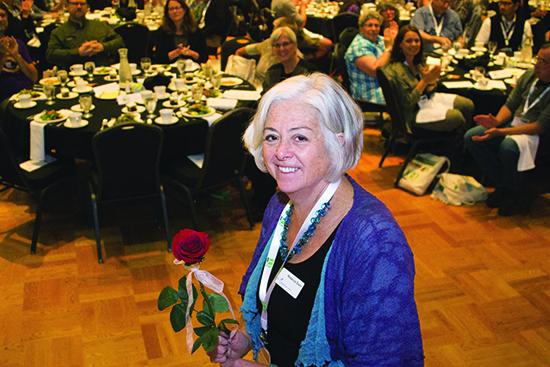Milestones and More

Among awards and milestones reported here and celebrated at the 60th annual Consumer Cooperative Management Association (CCMA) gathering, it is remarkable to note the 80th anniversary of Hanover Consumer Co-op and the 90th of Chatham Grocery Co-op. More within living memory, the 1970s marked the origin of most contemporary food co-ops, and this year we have an impressive class of 21 co-ops celebrating their 40th anniversary. Finally, in recent years many new food co-ops have successfully launched store operations, including 10 more during the past year.
Let’s join these groups in celebrating their accomplishments and community contributions, their continuing cooperative service!
1926
Chatham Grocery Co-op – Chatham, Mich.
1936
Hanover Consumer Co-op – Hanover, N.H.
1976
Belfast Co-op – Belfast, Me.
Bloomingfoods Co-op Grocery – Bloomington, Ind.
BriarPatch Co-op – Grass Valley, Calif.
Chequamegon Food Co-op – Ashland, Wis.
City Center Market – Cambridge, Minn.
Cook County Whole Foods Co-op – Grand Marais, Minn.
Deep Roots Co-op – Greensboro, N.C.
East Lansing Food Co-op – East Lansing, Mich.
Flatbush Food Co-op – Brooklyn, N.Y.
Frontier Natural Products Co-op – Norway, Iowa
Honest Weight Food Co-op – Albany, N.Y.
La Montanita Co-op Supermarket – Albuquerque, N.M.
Life Grocery Co-op – Marietta, Ga.
Linden Hills Co-op – Minneapolis, Minn.
Middlebury Natural Foods Co-op – Middlebury, Vt.
Natural Harvest Food Co-op – Virginia, Minn.
Ontario Natural Food Co-op – Mississauga, Ont.
Three Rivers Co-op – Fort Wayne, Ind.
Ukiah Co-op – Ukiah, Calif.
Upper Valley Food Co-op – White River Junction, Vt.
Wheatsville Food Co-op – Austin, Texas
1986
Hendersonville Food Co-op – Hendersonville, N.C.
1996
Rutland Food Co-op – Rutland, Vt.
2006
Chatham Marketplace – Pittsboro, N.C.
2016 (June 2015–June 2016)
Ticonderoga Natural Foods Co-op – Ticonderoga, N.Y.
Sugar Beet Co-op – Oak Park, Ill.
Grassroots Grocery – Alton, Ill.
Canyon County Co-op – Nampa, Idaho
Ideal Green Market Co-op – Pequot Lakes, Minn.
Macomb Food Co-op – Macomb, Ill.
Hub City Food Co-op – Spartanburg, S.C.
Underhill Country Store Co-op – Underhill Center, Vt.
Bisman Community Food Co-op – Bismarck, N.D.
East Aurora Cooperative Market – East Aurora, N.Y.
The theme at the 25th CCMA, in 1982, was: “Trouble in the Food System.” One implication of the anniversaries is that many other co-ops have closed. CCMA itself has survived the loss of many co-ops over time, while welcoming younger ones. To acknowledge this is more than a commonplace because having a national meeting place for all food co-ops has been critical to maintaining historical memory and generating further cooperation. Other associations food co-ops have formed, for the usual good reasons, may have membership requirements that exclude some co-ops.
The present generation of retail co-ops has succeeded in establishing cooperative bodies to protect and advance their local and collective interests. It’s fair to say that for most food co-ops today, to thrive or just survive has required having strong national cooperatives for group purchasing, professional development, and more. Additionally, co-ops in formation or newly opened now have training conferences and Food Co-op Initiative, a key ally.
A need remains for broad, inclusive forums in which all food co-ops can share, learn, and lead. That also is the aim of this publication and the online resources at Cooperative Grocer Network (grocer.coop), offering “CCMA every day.”
Meanwhile…
The coming years look to be very challenging for our society. While examples of solidarity and cooperation continue to evolve, we face looming threats to the economy and ecology. Most people and businesses appear unprepared for a future that may be quite different than the past. Aesop’s grasshoppers outnumber the ants.
“Another day older and deeper in debt.” It will be very hard to learn to live within our means. Many hope that, despite being on a finite planet, continued economic growth can magically be “decoupled” from energy use—but the latter and emissions keep growing. The resulting heat and storms will get more attention soon enough.
Under any circumstances, social capital in the form of cooperative and trusting relations will be essential. What persists is the need to defend and extend our values—to demonstrate the power of cooperative ownership and services that enable members and communities to share fairly the risks and benefits of critical social enterprise.
photo: Rebecca Dunn of Cooperative Fund of New England accepted the rose honoring the Fund's 40 years.







